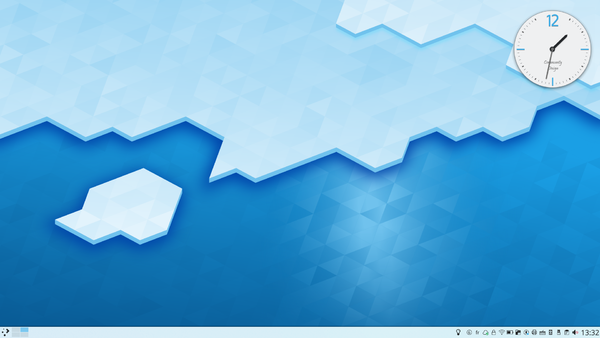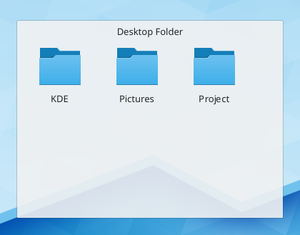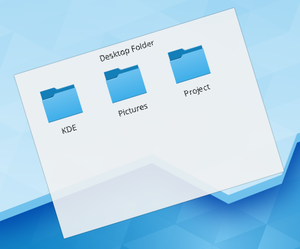Plasma/ja: Difference between revisions
Dream needle (talk | contribs) Created page with "=== パネル ===" |
Dream needle (talk | contribs) Created page with "パネルは、画面の端にウィジェットを置くことを可能にします。これらのウィジェットは、自動で非表示にしたり、画面上に整列..." |
||
| Line 42: | Line 42: | ||
[[Image:Panel_Settings.png|512px|center]] | [[Image:Panel_Settings.png|512px|center]] | ||
パネルは、画面の端にウィジェットを置くことを可能にします。これらのウィジェットは、自動で非表示にしたり、画面上に整列させたりするなど、様々な設定を行えます。 | |||
By default, there is one panel at the bottom of the screen, but you can add more panels, move and otherwise configure the default panel and remove panels you no longer want. The widgets in all of the panels may also be adjusted to your liking. | By default, there is one panel at the bottom of the screen, but you can add more panels, move and otherwise configure the default panel and remove panels you no longer want. The widgets in all of the panels may also be adjusted to your liking. | ||
Revision as of 13:50, 29 March 2019
概要
Plasmaは、KDEのワークスペースです。じつは、それはたくさんのデバイスに対応した技術です。現在、Plasmaには2つの種類があります: このページの大半が対象にしているPlasma Desktopと、タブレットとスマートフォンを対象にした新しく、クールなPlasma Mobileです。 Plasma Netbook はKDE Plasma 5では削除され、アプリケーションダッシュボードメニューに置き換えられました。
典型的なPlasmaのデスクトップです:

Plasmaには4つの重要なコンポネートがあります:
- 'パネル、タスクバーとも呼ばれます。ランチャー、ウィンドウ一覧、時計、システムトレイなどを配置する場所です。
- デスクトップ、ウィジェットやアイコンを配置します。
- The フォルダービュー、フォルダを表示するウィジェットです。 ファイルの管理をすばやく行えます。
- Plasma ツールボックス、画面の左上のパネルの端に配置されています。 設定やその他の機能をすばやく確実に行なえます。
これらのアイテムは、完全にカスタマイズでき、様々なものを保持できます。
Plasma DesktopのFAQ
現バージョンの Plasma Desktop の"よくある質問" は、 このページで管理されています。 よくある質問とそれへの簡潔な答えと、旧バージョンのFAQへのリンクがあります
Finding your way around Plasma
アプリケーションランチャーを使いタスクバーで現在のプログラムを確認し、システムトレイのアイコンにアクセスするなどすることで、他のOSのデスクトップと同じようにPlasmaを使用できます。
Plasmaの重要なものに、"ウィジェット"があります。ウィジェットはデスクトップの構成要素で、アプリケーションメニュー、アイコン、時計、システムトレイなど(数に限りがありません)様々なものを含んでいます。ウィジェットは独立しても配置できるだけでなく、パネルの中にも、スクリーンセーバーにも、ダッシュボードにも、他にも様々な場所に配置できます。ウィジェットは通常のデスクトップヘルパーとして多数存在し、(Twitter, identi.ca)などのマイクロブログ、単位換算機、天気予報、ファイルの共有など様々な種類のものがあります。パネルやデスクトップもそれら自身が特別なウィジェットで、他のウィジェットを含めるためにあります。
How does that relate with desktop usage? Plasma has some new features with respect to traditional desktop usage. We have already mentioned the Plasma toolboxes: those are the way to start interacting and customizing your Plasma Desktop. By clicking on them, a menu will pop up on the screen with a variety of choices: from there you can add widgets to your panel or desktop, resize, add or remove panels, change the wallpaper and other operations.
フォルダービュー
上のスクリーンショットで気づくかもしれませんが, デスクトップに直接配置されているアイコンがありません。 その代わりに、"フォルダービュー"が中に配置してあります。初期設定では、フォルダービューはデスクトップにフォルダーを配置し、ファイルのドラッグ、実行、切り取り、コピー、貼り付け、ファイル名の変更、新しいフォルダ/ファイルの作成などを行えるようにします。
フォルダービューは、デスクトップに1つ以上配置でき、パネルの中にも配置できます。あなたはフォルダービューに任意のフォルダー(ローカル/リモートどちらでも可能です)を表示でき、そのフォルダーにアクセスできます。各フォルダービューは設定に応じて独立して移動/サイズの変更を行えます。
また、フォルダービューを"デスクトップにアイコンが点在する" 伝統的なデスクトップのレイアウトとして設定することもできます。
パネル

パネルは、画面の端にウィジェットを置くことを可能にします。これらのウィジェットは、自動で非表示にしたり、画面上に整列させたりするなど、様々な設定を行えます。
By default, there is one panel at the bottom of the screen, but you can add more panels, move and otherwise configure the default panel and remove panels you no longer want. The widgets in all of the panels may also be adjusted to your liking.
For more information on configuring panels in Plasma Desktop and what they are capable of doing for you, visit the Plasma Panels page.
Latte Dock is an alternative panel.
Widgets

Plasma supports widgets written specifically for Plasma (also known as Plasmoids) as well as widgets from other sources such as Google Gadgets, Superkaramba and some Dashboard Widgets from Mac OSX. Additional widgets can easily be found and installed through Get Hot New Stuff.
To see the widgets that are installed on your system and ready to use open the Plasma Widget Explorer by either
- opening the Desktop Toolbox in the upper right corner of the screen and selecting ,
- opening the Panel Toolbox furthest to the right in the Panel and selecting , or
- right clicking on the Desktop and choosing from the context menu.
To place a widget on the Desktop simply drag it from the Widget Explorer to the Desktop. To place a widget in the panel first open the Panel Toolbox and from there open the Widget Explorer (click ), locate the widget you wish to add and drag it to the desired position in the Panel.
Widgets that are docked into a panel usually have an Options menu, while those on the desktop have the configuration options within the 'handle', the shaded area which pops up when hovering over the widget. Clicking and holding the mouse on the blank part of the handle will allow you to drag the widget to the desired position.

You have four tools on this handle. The top one is the re-sizer. Click and drag on the tool to resize the widget.
The second tool is a rotate tool. Again, click and hold the tool, while rotating to the desired angle.

The third is the wrench or spanner which allows you to configure that particular widget's settings.
Finally, the fourth tool is the "expanded view" tool and is available only on widgets that support this feature, such as the Picture Frame or Web viewers. When clicked, the Picture Frame widget will, for example, open the currently viewed in an image viewer while the Web Slice widget will open the web page in a full web browser window.
A list of Plasma widgets with their own page can be found here, and some of our favourite widgets are discussed on the Plasma Widgets page
Activities
The icons shown in the screenshot have small buttons in the top right and bottom right. The small pause button in the top right prevents the activity from being included when switching through Activities using Super + Tab. It also opens up an "x" to delete the activity. To change the names of the activities, look for the small wrench in the bottom right of the icon.

Use Cases
A user likes web comics so they add their favorite web comics via the comics widget. The user now has a full desktop activity dedicated to their favorite web comics. Now the user is happy with the web comics, but the user now has to go to work, so the user creates an activity with the folder view widgets set to the folders of the projects the user is currently working on. After work the user goes home and works on a side project of writing romance novels. The user always gains inspiration by looking at pictures of the user's significant other. The user now creates a new Activity but now puts pictures frame widgets with pictures of the user's significant other. The user also has a folder view of the romance novel project folder. Now no matter what the user is doing the user has a custom tailored activity to match it.
Go to this blog to read a few tips on using activities. Chanis blog has a number of examples as well as screencasts about activities.
Widget Layouts and Virtual Desktops
Virtual desktops, the ability to have a separate sets of windows on separate desktops, can tie in with Activities. You can have a different activity on each virtual desktop. In Plasma Desktop 4.4, this can be configured by entering and navigating to , and checking .
In Plasma Desktop 4.3, You configure this by zooming out and choosing . Then select and zoom in again.
Hints and Tips
Tweaking Plasma
- Learn how to add a sidebar with clock and news
- Customize your Plasma by mixing multiple Plasma themes
- Learn how to create a look and feel package
Reloading Plasma
Sometimes you might want to reload Plasma, like right after changing system language so the changes takes effect, or because of a problem with the desktop. To do that, open a terminal(or KRunner) and run these commands:
kquitapp5 plasmashell
kstart5 plasmashell
Further information
- The Plasma FAQ's
- Plasma HowTo's - short screencasts
- Glossary
- Some of our favourite plamoids - why not add yours?
- Here's how to install more Plasmas widgets
- Learn the versatility of KRunner
| Back to the Introduction page |

